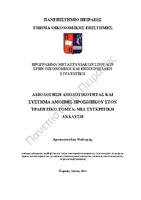Αξιολόγηση αποδοτικότητας και σύστημα αμοιβής προσωπικού στον τραπεζικό τομέα: Μια συγκριτική ανάλυση.
Performance evaluation and personnel payment system in the banking sector: A comparative analysis

Θεματική επικεφαλίδα
Τράπεζες και τραπεζικές εργασίες ; Τραπεζικοί υπάλληλοι ; Μισθοί και ημερομίσθια ; ΑποδοτικότηταΠερίληψη
Το θέμα της παρούσας διπλωματικής εργασίας είναι η θεωρητική προσέγγιση και διερεύνηση της αξιολόγησης της αποδοτικότητας των συστημάτων αμοιβής προσωπικού στις ελληνικές επιχειρήσεις και ειδικότερα στην περίπτωση των τραπεζών. Αρχικά στην εισαγωγή παρατίθενται εισαγωγικοί ορισμοί, καθώς και ο σκοπός, η δομή, η υπόθεση και η μέθοδος που θα χρησιμοποιηθεί στην συγγραφή της παρούσας διπλωματικής εργασίας. Το 1ο κεφάλαιο περιλαμβάνει μια εκτενή αναφορά σε εισαγωγικές έννοιες της αξιολόγησης. Στη συνέχεια αναφέρονται στοιχεία από την διαχείριση προσωπικού, τις δραστηριότητες των επιχειρήσεων (μάρκετινγκ, δεξιότητες στον τομέα της διαχείρισης, παραγωγικότητα), την αξιολόγηση της αποδοτικότητας των εργαζομένων και τη διαδικασία της (ανάλυση θέσεων εργασίας, καθορισμός επιθυμητών αποτελεσμάτων, ανάπτυξη τρόπων μέτρησης των αποτελεσμάτων), τον σκοπό της αξιολόγησης της αποδοτικότητας, τα πλεονεκτήματα και τα μειονεκτήματα της αξιολόγησης της αποδοτικότητας (σφάλματα μεταβλητών, σταθερά σφάλματα, οικειότητα, παραπληροφόρηση, φαινόμενο Mathew Effect, το φαινόμενο της γενίκευσης (the halo effect), τον καθορισμό των παραμέτρων της αξιολόγησης και τέλος τις μεθόδους αξιολόγησης της απόδοσης των εργαζομένων (αξιολόγηση με βάση τη σύγκριση, αξιολόγηση με βάση απόλυτα κριτήρια, αξιολόγηση με βάση την επίτευξη αντικειμενικών στόχων, αξιολόγηση με άμεση μέτρηση της αποδοτικότητας). Στο 2ο κεφάλαιο το ενδιαφέρον στρέφεται πιο συγκεκριμένα στα συστήματα αμοιβής προσωπικού. Σ’ αυτή την προσπάθεια εντάσσονται η αξιολόγηση ικανοτήτων, η διαχείριση ταλέντων (μοντέλα ιδιοτήτων, πλάνο διαδοχής, συστήματα επιλογής, προγραμματισμός εξέλιξης και ανάπτυξης), οι αμοιβές (στρατηγική αμοιβών, πλαίσιο στρατηγικής αμοιβών, αμοιβές ανωτάτων στελεχών, αξιολόγηση θέσεων εργασίας, παροχές). Στο 3ο κεφάλαιο εξετάζεται ο μηχανισμός δράσης των Τραπεζών για την διαχείριση προσωπικού. Θα καταγραφούν εισαγωγικές έννοιες για τους ανθρώπινους πόρους (βασικές έννοιες και ορισμοί, ανθρώπινο δυναμικό, η σημασία του ανθρώπινου παράγοντα), η Διοίκηση Ανθρώπινων Πόρων (η σημασία της στις σύγχρονες επιχειρήσεις και οι λειτουργίες της), η Διοίκηση Απόδοσης (πολιτικές αξιολόγησης και αξιοποίησης ανθρώπινου δυναμικού, εκπαίδευση ανθρώπινου δυναμικού, συστήματα αμοιβών) και τέλος το τραπεζικό σύστημα (σύγχρονες εξελίξεις και προκλήσεις στο διεθνές τραπεζικό σύστημα, η σημασία της διαχείρισης ανθρώπινου δυναμικού στον ελληνικό τραπεζικό χώρο, σύνδεση εννοιών ανθρώπινοι πόροι – κατάρτιση στις τράπεζες, κανονιστικό πλαίσιο επαγγελματικής κατάρτισης). Στο 4ο κεφάλαιο παρέχονται τα στοιχεία αξιολόγησης της αποδοτικότητας και το σύστημα αμοιβής του προσωπικού στην Τράπεζα Πειραιώς. Παρουσιάζεται ο τρόπος στελέχωσης καιη επαγγελματική εξέλιξη, η μορφή εργασίας στην Τράπεζα Πειραιώς (ανοιχτή επικοινωνία, περιβάλλον εργασίας, προγράμματα υποστήριξης εργαζομένων, αποδοχές & παροχές) και τέλος η εταιρική διακυβέρνηση (διαφορετικότητα και ίσες ευκαιρίες εργασίας, ανθρώπινα & εργασιακά δικαιώματα). Το θέμα του 5ου κεφαλαίου είναι η αξιολόγηση της αποδοτικότητας και το σύστημα αμοιβής του προσωπικού στην Εθνική Τράπεζα. Δίνονται στοιχεία για τον τρόπο της επιλογής του προσωπικού στην Εθνική Τράπεζα, την εκπαίδευση και ανάπτυξη του προσωπικού, την αξιολόγηση των εργαζομένων, το σύστημα μισθοδοσίας, τις ίσες ευκαιρίες και την υποστήριξη της διαφορετικότητας, τις κοινωνικές παροχές προς τους εργαζόμενους (υποστήριξη των οικογενειών των εργαζομένων) και τέλος τις συλλογικές συμβάσεις (προσωπικό ανά σύμβαση εργασίας και τύπο απασχόλησης, στελέχωση & επαγγελματική εξέλιξη). Στο 6ο κεφάλαιο παρουσιάζονται, συγκρίνονται και αξιολογούνται τα συστήματα αμοιβής των δύο τραπεζών. Παρουσιάζεται η συλλογική σύμβαση εργασίας των Ελληνικών τραπεζών (βασικός μισθός, επίδομα ισολογισμού, ωράριο λειτουργίας κεντρικών υπηρεσιών, επιτόκιο στεγαστικών δανείων, διατήρηση θέσεων εργασίας, πολιτιστικές και αθλητικές δραστηριότητες, δραστηριότητες ΙΝΕ/ΟΤΟΕ, τελικές διατάξεις, διάρκεια), οι τελευταίες εξελίξεις 2013-2014, οι διεθνείς συγκρίσεις και τέλος οι μισθολογικές διαφοροποιήσεις και ανισότητες (η κατανομή των αποδοχών στον Χρηματοπιστωτικό Τομέα). Στο τελευταίο κεφάλαιο προκύπτουν προβληματισμοί και εξάγονται συμπεράσματα για τον τρόπο αξιολόγησης της αποδοτικότητας των συστημάτων αμοιβής προσωπικού στις ελληνικές επιχειρήσεις και ειδικότερα της Εθνικής Τράπεζας και της Τράπεζας Πειραιώς.
Πανεπιστήμιο Πειραιώς.


